17 January 2025
Weekly Market View
Trump vs. the bond market
As President Trump returns to the White House, one of his first tasks is likely to be assuaging bond markets. A sharp rise in US bond yields in the past month reflects resilient US growth, but also rising concerns about the impact of Trump’s policies.
Investors will look for reassurance that he is responsive to markets. We expect his pro-growth tax cut and deregulation plans to outweigh concerns about his trade and immigration policies, and thus remain pro-risk in our asset allocation.
We particularly like US equities, with a preference for the financial sector, especially after this week’s solid Q4 bank earnings, which reflect underlying strength. The sector is likely to be a primary beneficiary of deregulation under the Trump administration.
Meanwhile, we have revised our 3-month USD target higher, with downgrades to GBP, AUD, NZD and CNH estimates. We will look for opportunities to sell the USD in the coming weeks, especially on any near-term tariff-related bump. USD/JPY looks vulnerable if the BoJ hikes rates next week.
What is the outlook for US equities amid the recent surge in bond yields?
Is recent Indian equity market weakness a worry or an opportunity?
What is the outlook for the USD and other major currency pairs?
Charts of the week: Is Trump listening?
Although US inflation softened lately, strong growth and policy uncertainty have driven bond yields higher
The breakdown of the US 10-year government bond yield*
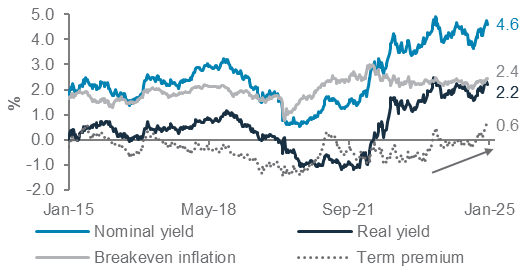
US core, core services less housing and shelter inflation
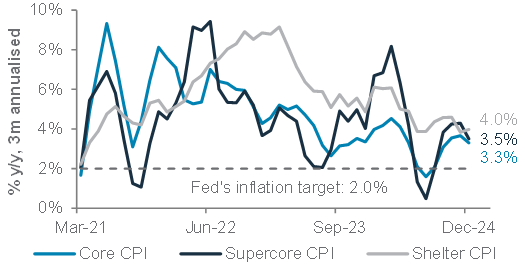
Source: Bloomberg, Standard Chartered; *real yield = inflation adjusted yield; breakeven inflation = 10-year inflation expectation derived from bond market, 10-year term premium = extra yield investors demand to hold longer-term bonds vs. shorter-term bonds (Adrian, Crump & Moench)
Editorial
Trump vs. the bond market
As President Trump returns to the White House, one of his first tasks is likely to be assuaging bond markets. A sharp rise in US bond yields in the past month reflects resilient US growth, but also rising concerns about the impact of Trump’s policies. Investors will look for reassurance that he is responsive to markets. We expect his pro-growth tax cut and deregulation plans to outweigh concerns about his trade and immigration policies, and thus remain pro-risk in our asset allocation.
We particularly like US equities, with a preference for the financial sector, especially after this week’s solid Q4 bank earnings, which reflect underlying strength. The sector is likely to be a primary beneficiary of deregulation under the Trump administration. Meanwhile, we have revised our 3-month USD target higher, with downgrades to GBP, AUD, NZD and CNH estimates. We will look for opportunities to sell the USD in the coming weeks, especially on any near-term tariff-related bump.
Bond markets pricing uncertainty: After a sharp run up over the past month, the US 10-year government bond yield pulled back this week from a 14-month high of 4.8% after softer-than-expected US inflation data for December eased some near-term inflation concerns. Nevertheless, the so-called term premium (the extra yield that investors demand to hold longer term bonds) has risen to a 10-year high, reflecting uncertainty about the impact of Trump’s policies on long-term inflation expectations and the fiscal deficit. The latest University of Michigan consumer survey showed 5-10-year inflation expectations rose to 3.3% in January, its highest since 2008. The past month’s surge in oil prices, especially after President Biden’s new sanctions against Russian entities this week, is another factor that could drive inflation expectations higher. This makes Trump’s policy direction in the early days of the administration increasingly important for bond markets.
Political compulsions vs market feedback: Some of Trump’s closest advisors, including Treasury Secretary nominee Scott
Bessent, are market veterans. Hence, although Trump is likely to start delivering on his election promises, including imposing tariffs on trade partners, we expect his team to craft policies with a sharp ear for feedback from markets. Reports suggest some of Trump’s advisors are studying gradual tariff hikes of 2-5% per month, primarily as negotiating tools to achieve their objective of boosting US exports, curbing imports and bringing back manufacturing investment and jobs to the US.
Opportunity to average into bonds: A gradual tariffs policy would have a low impact on near-term inflation but risks stoking long-term inflation expectations due to uncertainty about the duration and scale of such tariffs. Nevertheless, we expect any resultant rise in the US 10-year bond yield to 5% would trigger a reassessment of policies. Higher bond yields are also self-limiting as they tighten financial conditions. The Fed is also likely to end its bond sales (quantitative tightening) programme in the event of further spike in yields. Given this, we would look to lock in the elevated yields, preferring US high yield bonds which are likely to benefit from Trump’s pro-growth policies. The 7.3% yield on US high yield bonds provides a sizable buffer to investors worried about negative total returns.
Strong bank earnings underscore US equity overweight. Major US banks delivered strong Q4 earnings beats this week, buoyed by loan growth and investment banking revenue. We expect the US financial sector to outperform the broader market this year amid elevated rates, rebounding loan growth and wealth and corporate advisory income. The sector is also likely to be a key beneficiary of Trump’s deregulation policies. Strong bank earnings also reflect robust underlying economic strength, underscoring our Overweight on US equities (see page 4).
USD likely nearing a peak. We revise higher our 3-month US dollar target, with downgrades to GBP, AUD, NZD and CNH estimates (see page 5). However, near-term USD trend is likely to be driven by the scale of Trump’s tariff plans. We would look to sell the USD in the event of any tariff-related bump. USD/JPY looks particularly vulnerable if the BoJ hikes rates next week.
The weekly macro balance sheet
Our weekly net assessment: On balance, we see the past week’s data and policy as Neutral for risk assets in the near-term
(+) factors: Softer US core inflation and robust job market
(-) factors: Rising inflation expectations in US; rising US-China tensions
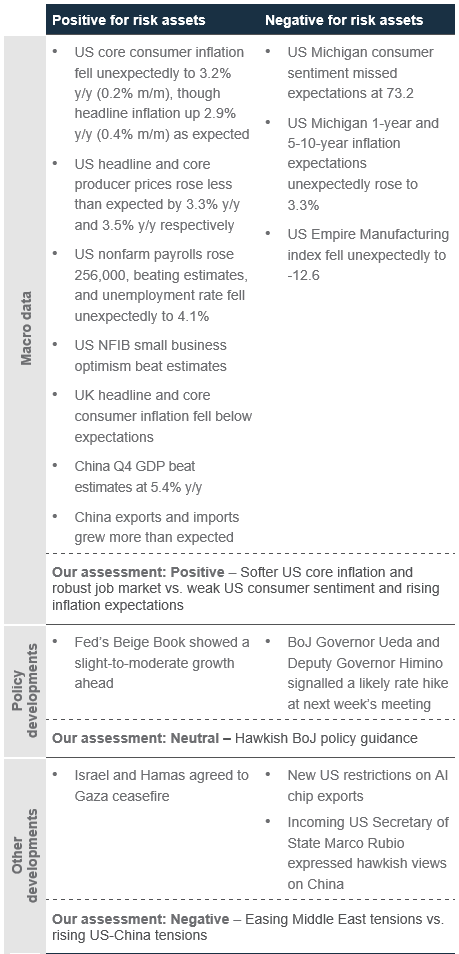
US job creation accelerated for the second straight month, lowering the unemployment rate below the Fed’s long-run estimate of 4.2%
US nonfarm payrolls, unemployment rate
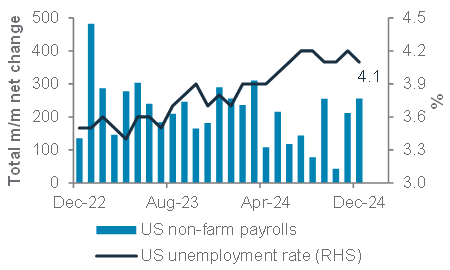
UK headline and core consumer inflation fell below expectations in December, easing stagflation concerns
UK headline and core consumer inflation
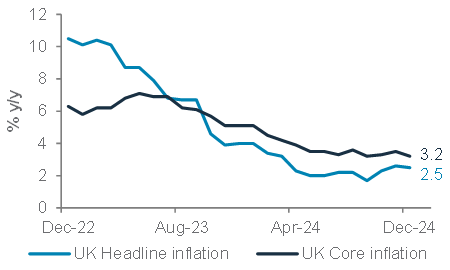
China’s exports and imports rose more than expected, with exports likely driven by last-minute purchases before potential Trump tariffs
China export and import growth
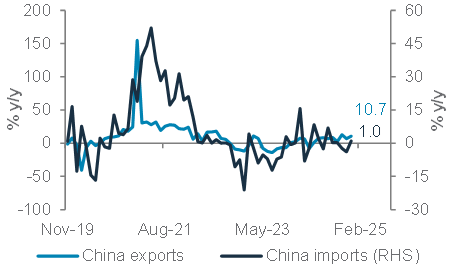
Source: Bloomberg, Standard Chartered
Top client questions
What is the outlook for US equities amid the recent surge in bond yields and the ongoing earnings season?
A persistent uptrend in both the USD and government bond yields in recent months have led to the pullback in risky assets this year. That said, we see the recent consolidation in the US equity market as an attractive opportunity to add exposure. First, a moderation in US inflation in December calmed worries of an inflation rebound, which could have otherwise fuelled a further rise in the US 10-year government bond yield. Second, early prints of Q4 earnings point towards continued healthy earnings growth. According to LSEG I/B/E/S, S&P 500 index earnings are expected to rise by 10.4% in Q4 – an upward revision from just below 10% at the start of 2025.
In particular, financial sector earnings are expected to grow at 24.5% in Q4. As of 15 January, the sector has delivered an earnings surprise of 18.3%. The recovery in investment banking revenue and sustained net interest margins are expected to be the key drivers for the upbeat earnings in US major banks.
While a less-dovish Fed remains a risk, we remain overweight US financials and expected them to be fuelled by strong growth, potential deregulation and a steeper yield curve.
— Michelle Kam, Investment Strategist
Earnings projections for the US financial sector have been revised higher since the start of 2025
Projected earnings growth of the Financials sector and S&P 500 index, on 1-Jan-2025 vs. 15-Jan-2025.
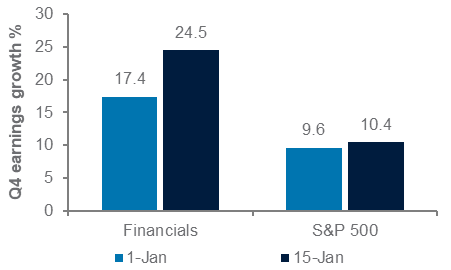
LSEG I/B/E/S, Standard Chartered
What is the likely impact on US bond yields from recent inflation prints and Trump’s proposed policies?
The rise in the 10-year US government bond yield, initially supported by a strong jobs report in early January, has been tempered after the release of softer than expected Producer and Consumer Prices this week. Despite inflation worries, we still expect the Fed to cut rates 3 times this year, more than the 1-2 expected by markets.
While long maturity yields can remain elevated, we see limited potential for significant spikes. According to Bloomberg, the new Trump administration is considering pacing tariff hikes, indicating an awareness of the impact tariffs can have on inflation. In theory, a more gradual increase in tariffs will limit the immediate inflation impact. However, it could lead to a build-up of long-term inflation expectations, and it is unclear if such an impact will be long-lasting.
Against this context, we see an opportunity to lock in today’s attractive yields for income. Within bonds, we prefer developed market high yield as default rates remain low in a resilient US economy. A 5-7-year average maturity profile likely offers the most attractive trade-off between exposure to potential repricing or more Fed rate cuts and the yield pickup from longer maturities.
— Ray Heung, Senior Investment Strategist
We see limited likelihood of the US 10-year government bond yield rising significantly higher
US headline consumer and producer inflation; US 10 year benchmark yield
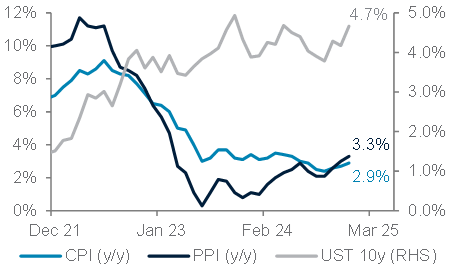
Source: Bloomberg, Standard Chartered
Top client questions (cont’d)
Will long-term US government bond yields and the USD stay higher for longer?
Indian equities faced renewed weakness in January, driven by tepid early earnings reports this quarter, INR weakness in the face of USD gains and rising bond yields amid higher inflation uncertainty.
The nature of US tariff policy remains a risk, but a more accommodative trade policy should limit the drag on manufacturing exports. India’s relatively large domestic economy also makes it relatively less vulnerable compared to peers. The upcoming budget and RBI policy meetings are the next areas of focus. The government is expected to largely stay on its fiscal consolidation path, but we expect a broadening of policy measures to support consumption and retain an investment focus. We also expect the RBI to start easing in H1 2025 to support growth.
These, together with our long-term preference for Indian equities within Asia ex-Japan, mean that while further near-term volatility is possible, we would adopt a buy-on-dips strategy, especially in large-caps where we see more attractive earnings stability and valuations.
— Ravi Kumar Singh, Chief Investment Strategist, India
Indian equity valuations look reasonable after the most recent pullback
MSCI India index 12-month forward price-to-earnings ratio, 5-year average
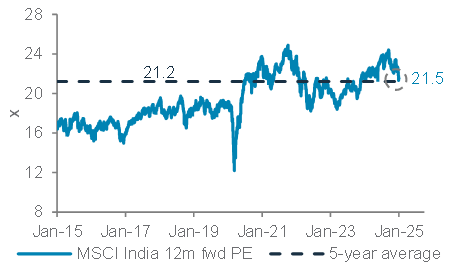
What is the outlook for the USD and other major currency pairs?
We update our 3-month views on major currency pairs, summarized in the table on the right. Changes are largely driven by an upward revision in our US Dollar Index (DXY) forecast to 107 (from 106 previously). The greenback has risen to test 110 on the back of stronger US labour data and the resulting rise in US bond yields. However, a likely pricing in of Trump policy concerns, a softer US core inflation reading and reports that tariff hikes may be introduced in a gradual manner could help the US Dollar partially reverse its rise, especially if US bond yields also soften.
Our forecast for GBP/USD over the next 3 months has been revised to 1.24, from 1.28 previously. UK inflation unexpectedly cooled for the first time in three months in December, adding to bets that the BoE will cut rates this year. This also helped calm GBP bond markets after a week of turmoil that pushed yields to a 17-year high; lower yields should help cap gains in GBP, even if the USD turns lower. We see 1.20 as the key near-term support from where a short-term rebound from oversold territory is likely.
— Iris Yuen, Investment Strategist
We revise up our 3-month USD forecast and downgrade forecasts for GBP, AUD, NZD and CNH
Our revised 3-month forecasts
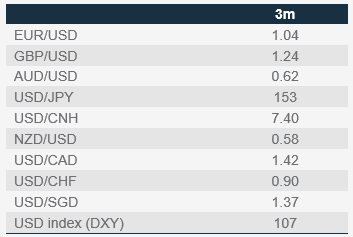
Source: Bloomberg, Standard Chartered
Top client questions (cont’d)
Will oil prices continue to rise amid geopolitical tensions? What are our latest views on commodity currencies?
Oil prices have been well supported in recent weeks, led by expectations that renewed US sanctions on Russia’s energy industry and Iran could have an impact on supply. Recent US data also illustrated a drawdown on oil inventories, adding to near-term supply concerns. However, on a full year basis we still see the oil market as oversupplied, with relatively weak demand growth balanced by what is likely to be significant supply and spare capacity both within and outside OPEC+. This means oil prices are likely to be capped unless the demand outlook improved significantly (for example, via a Chinese growth stimulus).
From a domestic fundamentals point of view, Canada’s terms-of-trade has risen significantly since mid-December while the surprising improvement in recent labour market data is likely to act as a tailwind for the Canadian dollar. We see USD/CAD edging lower in the near-term and testing its support at 50-day moving average at 1.42.
— Iris Yuen, Investment Strategist
Oil prices and USD/CAD
Oil prices (inverted) and USD/CAD
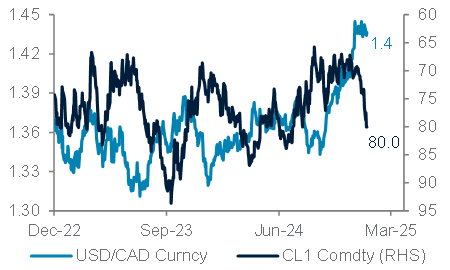
Source: Bloomberg, Standard Chartered
Market performance summary*
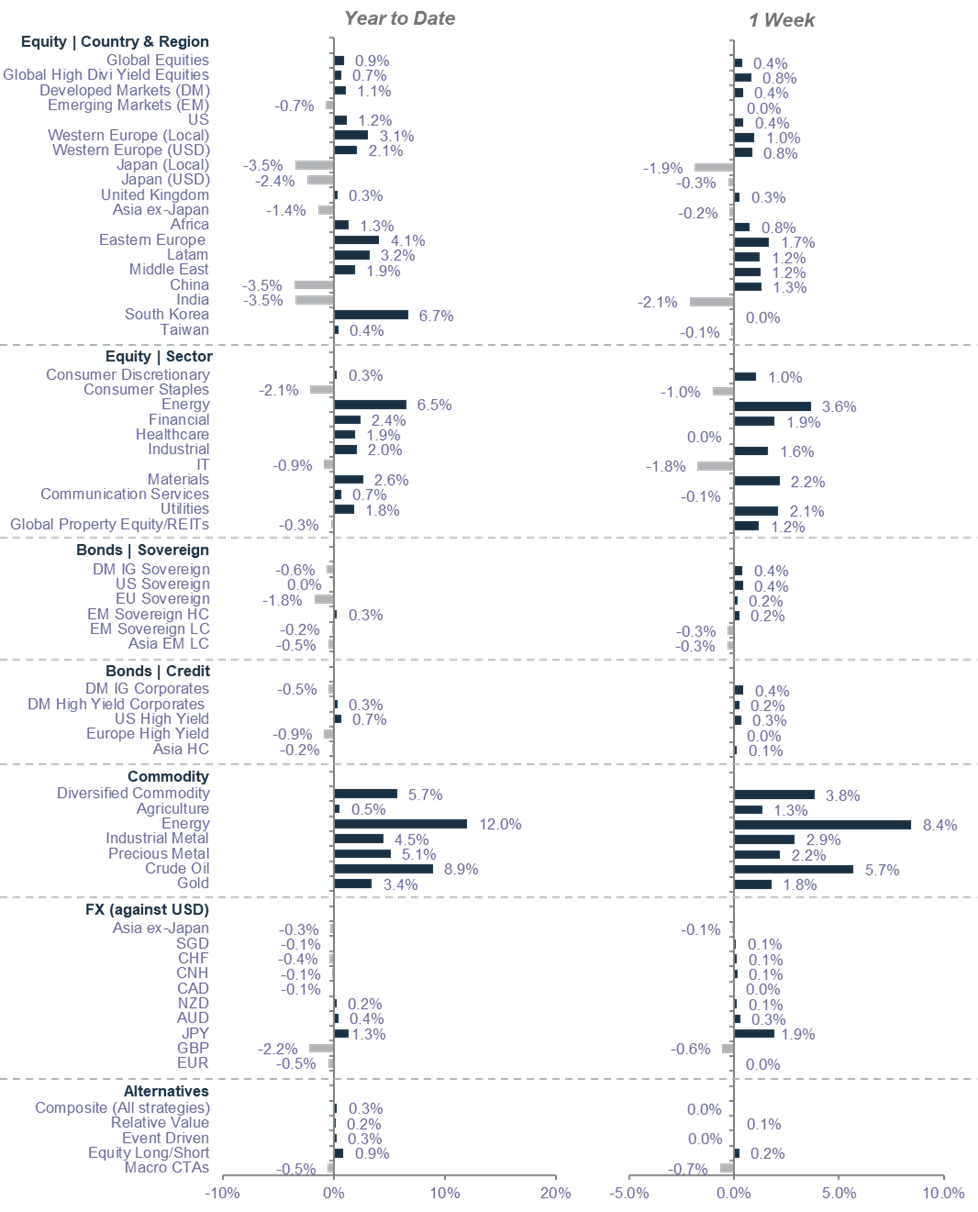
Sources: MSCI, JP Morgan, Barclays Capital, Citigroup, Dow Jones, HFRX, FTSE, Bloomberg, Standard Chartered. *Performance in USD terms unless otherwise stated, 2025 YTD performance from 31 Dec 2024 to 16 Jan 2025; 1-week period: 9 to 16 Jan 2025
Our 12-month asset class views at a glance
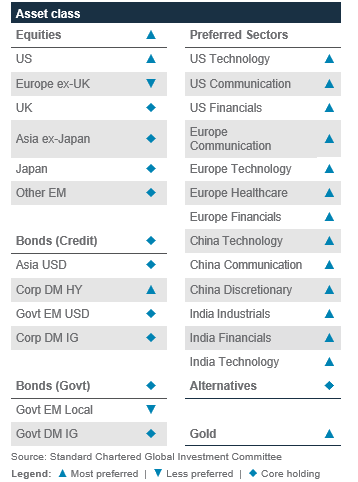
Economic and market calendar
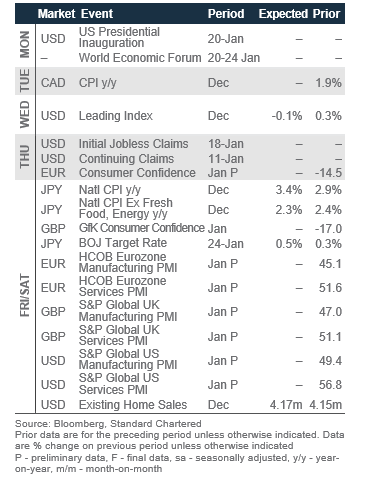
The S&P500 has next interim resistance at 6,081
Technical indicators for key markets as of 16 Jan close
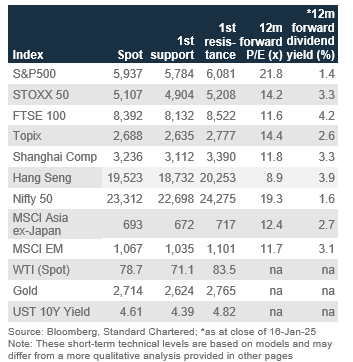
Investor diversity has normalised across asset classes
Our proprietary market diversity indicators as of 16 Jan close
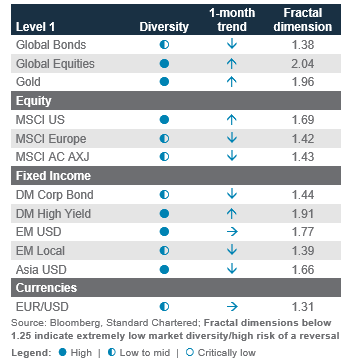

Disclosure
This document is confidential and may also be privileged. If you are not the intended recipient, please destroy all copies and notify the sender immediately. This document is being distributed for general information only and is subject to the relevant disclaimers available at our Standard Chartered website under Regulatory disclosures. It is not and does not constitute research material, independent research, an offer, recommendation or solicitation to enter into any transaction or adopt any hedging, trading or investment strategy, in relation to any securities or other financial instruments. This document is for general evaluation only. It does not take into account the specific investment objectives, financial situation or particular needs of any particular person or class of persons and it has not been prepared for any particular person or class of persons. You should not rely on any contents of this document in making any investment decisions. Before making any investment, you should carefully read the relevant offering documents and seek independent legal, tax and regulatory advice. In particular, we recommend you to seek advice regarding the suitability of the investment product, taking into account your specific investment objectives, financial situation or particular needs, before you make a commitment to purchase the investment product. Opinions, projections and estimates are solely those of SC at the date of this document and subject to change without notice. Past performance is not indicative of future results and no representation or warranty is made regarding future performance. The value of investments, and the income from them, can go down as well as up, and you may not recover the amount of your original investment. You are not certain to make a profit and may lose money. Any forecast contained herein as to likely future movements in rates or prices or likely future events or occurrences constitutes an opinion only and is not indicative of actual future movements in rates or prices or actual future events or occurrences (as the case may be). This document must not be forwarded or otherwise made available to any other person without the express written consent of the Standard Chartered Group (as defined below). Standard Chartered Bank is incorporated in England with limited liability by Royal Charter 1853 Reference Number ZC18. The Principal Office of the Company is situated in England at 1 Basinghall Avenue, London, EC2V 5DD. Standard Chartered Bank is authorised by the Prudential Regulation Authority and regulated by the Financial Conduct Authority and Prudential Regulation Authority. Standard Chartered PLC, the ultimate parent company of Standard Chartered Bank, together with its subsidiaries and affiliates (including each branch or representative office), form the Standard Chartered Group. Standard Chartered Private Bank is the private banking division of Standard Chartered. Private banking activities may be carried out internationally by different legal entities and affiliates within the Standard Chartered Group (each an “SC Group Entity”) according to local regulatory requirements. Not all products and services are provided by all branches, subsidiaries and affiliates within the Standard Chartered Group. Some of the SC Group Entities only act as representatives of Standard Chartered Private Bank and may not be able to offer products and services or offer advice to clients.
Copyright © 2025, Accounting Research & Analytics, LLC d/b/a CFRA (and its affiliates, as applicable). Reproduction of content provided by CFRA in any form is prohibited except with the prior written permission of CFRA. CFRA content is not investment advice and a reference to or observation concerning a security or investment provided in the CFRA SERVICES is not a recommendation to buy, sell or hold such investment or security or make any other investment decisions. The CFRA content contains opinions of CFRA based upon publicly-available information that CFRA believes to be reliable and the opinions are subject to change without notice. This analysis has not been submitted to, nor received approval from, the United States Securities and Exchange Commission or any other regulatory body. While CFRA exercised due care in compiling this analysis, CFRA, ITS THIRD-PARTY SUPPLIERS, AND ALL RELATED ENTITIES SPECIFICALLY DISCLAIM ALL WARRANTIES, EXPRESS OR IMPLIED, INCLUDING, BUT NOT LIMITED TO, ANY WARRANTIES OF MERCHANTABILITY OR FITNESS FOR A PARTICULAR PURPOSE OR USE, to the full extent permitted by law, regarding the accuracy, completeness, or usefulness of this information and assumes no liability with respect to the consequences of relying on this information for investment or other purposes. No content provided by CFRA (including ratings, credit-related analyses and data, valuations, model, software or other application or output therefrom) or any part thereof may be modified, reverse engineered, reproduced or distributed in any form by any means, or stored in a database or retrieval system, without the prior written permission of CFRA, and such content shall not be used for any unlawful or unauthorized purposes. CFRA and any third-party providers, as well as their directors, officers, shareholders, employees or agents do not guarantee the accuracy, completeness, timeliness or availability of such content. In no event shall CFRA, its affiliates, or their third-party suppliers be liable for any direct, indirect, special, or consequential damages, costs, expenses, legal fees, or losses (including lost income or lost profit and opportunity costs) in connection with a subscriber’s, subscriber’s customer’s, or other’s use of CFRA’s content.
Market Abuse Regulation (MAR) Disclaimer
Banking activities may be carried out internationally by different branches, subsidiaries and affiliates within the Standard Chartered Group according to local regulatory requirements. Opinions may contain outright “buy”, “sell”, “hold” or other opinions. The time horizon of this opinion is dependent on prevailing market conditions and there is no planned frequency for updates to the opinion. This opinion is not independent of Standard Chartered Group’s trading strategies or positions. Standard Chartered Group and/or its affiliates or its respective officers, directors, employee benefit programmes or employees, including persons involved in the preparation or issuance of this document may at any time, to the extent permitted by applicable law and/or regulation, be long or short any securities or financial instruments referred to in this document or have material interest in any such securities or related investments. Therefore, it is possible, and you should assume, that Standard Chartered Group has a material interest in one or more of the financial instruments mentioned herein. Please refer to our Standard Chartered website under Regulatory disclosures for more detailed disclosures, including past opinions/ recommendations in the last 12 months and conflict of interests, as well as disclaimers. A covering strategist may have a financial interest in the debt or equity securities of this company/issuer. This document must not be forwarded or otherwise made available to any other person without the express written consent of Standard Chartered Group.
Sustainable Investments
Any ESG data used or referred to has been provided by Morningstar, Sustainalytics, MSCI or Bloomberg. Refer to 1) Morningstar website under Sustainable Investing, 2) Sustainalytics website under ESG Risk Ratings, 3) MCSI website under ESG Business Involvement Screening Research and 4) Bloomberg green, social & sustainability bonds guide for more information. The ESG data is as at the date of publication based on data provided, is for informational purpose only and is not warranted to be complete, timely, accurate or suitable for a particular purpose, and it may be subject to change. Sustainable Investments (SI): This refers to funds that have been classified as ‘Sustainable Investments’ by Morningstar. SI funds have explicitly stated in their prospectus and regulatory filings that they either incorporate ESG factors into the investment process or have a thematic focus on the environment, gender diversity, low carbon, renewable energy, water or community development. For equity, it refers to shares/stocks issued by companies with Sustainalytics ESG Risk Rating of Low/Negligible. For bonds, it refers to debt instruments issued by issuers with Sustainalytics ESG Risk Rating of Low/Negligible, and/or those being certified green, social, sustainable bonds by Bloomberg. For structured products, it refers to products that are issued by any issuer who has a Sustainable Finance framework that aligns with Standard Chartered’s Green and Sustainable Product Framework, with underlying assets that are part of the Sustainable Investment universe or separately approved by Standard Chartered’s Sustainable Finance Governance Committee. Sustainalytics ESG risk ratings shown are factual and are not an indicator that the product is classified or marketed as “green”, “sustainable” or similar under any particular classification system or framework.
Country/Market Specific Disclosures
Botswana: This document is being distributed in Botswana by, and is attributable to, Standard Chartered Bank Botswana Limited which is a financial institution licensed under the Section 6 of the Banking Act CAP 46.04 and is listed in the Botswana Stock Exchange. Brunei Darussalam: This document is being distributed in Brunei Darussalam by, and is attributable to, Standard Chartered Bank (Brunei Branch) | Registration Number RFC/61 and Standard Chartered Securities (B) Sdn Bhd | Registration Number RC20001003. Standard Chartered Bank is incorporated in England with limited liability by Royal Charter 1853 Reference Number ZC18. Standard Chartered Securities (B) Sdn Bhd is a limited liability company registered with the Registry of Companies with Registration Number RC20001003 and licensed by Brunei Darussalam Central Bank as a Capital Markets Service License Holder with License Number BDCB/R/CMU/S3-CL and it is authorised to conduct Islamic investment business through an Islamic window. China Mainland: This document is being distributed in China by, and is attributable to, Standard Chartered Bank (China) Limited which is mainly regulated by National Financial Regulatory Administration (NFRA), State Administration of Foreign Exchange (SAFE), and People’s Bank of China (PBOC). Hong Kong: In Hong Kong, this document, except for any portion advising on or facilitating any decision on futures contracts trading, is distributed by Standard Chartered Bank (Hong Kong) Limited (“SCBHK”), a subsidiary of Standard Chartered PLC. SCBHK has its registered address at 32/F, Standard Chartered Bank Building, 4-4A Des Voeux Road Central, Hong Kong and is regulated by the Hong Kong Monetary Authority and registered with the Securities and Futures Commission (“SFC”) to carry on Type 1 (dealing in securities), Type 4 (advising on securities), Type 6 (advising on corporate finance) and Type 9 (asset management) regulated activity under the Securities and Futures Ordinance (Cap. 571) (“SFO”) (CE No. AJI614). The contents of this document have not been reviewed by any regulatory authority in Hong Kong and you are advised to exercise caution in relation to any offer set out herein. If you are in doubt about any of the contents of this document, you should obtain independent professional advice. Any product named herein may not be offered or sold in Hong Kong by means of any document at any time other than to “professional investors” as defined in the SFO and any rules made under that ordinance. In addition, this document may not be issued or possessed for the purposes of issue, whether in Hong Kong or elsewhere, and any interests may not be disposed of, to any person unless such person is outside Hong Kong or is a “professional investor” as defined in the SFO and any rules made under that ordinance, or as otherwise may be permitted by that ordinance. In Hong Kong, Standard Chartered Private Bank is the private banking division of SCBHK, a subsidiary of Standard Chartered PLC. Ghana: Standard Chartered Bank Ghana Limited accepts no liability and will not be liable for any loss or damage arising directly or indirectly (including special, incidental or consequential loss or damage) from your use of these documents. Past performance is not indicative of future results and no representation or warranty is made regarding future performance. You should seek advice from a financial adviser on the suitability of an investment for you, taking into account these factors before making a commitment to invest in an investment. To unsubscribe from receiving further updates, please send an email to feedback.ghana@sc.com. Please do not reply to this email. Call our Priority Banking on 0302610750 for any questions or service queries. You are advised not to send any confidential and/or important information to Standard Chartered via e-mail, as Standard Chartered makes no representations or warranties as to the security or accuracy of any information transmitted via e-mail. Standard Chartered shall not be responsible for any loss or damage suffered by you arising from your decision to use e-mail to communicate with the Bank. India: This document is being distributed in India by Standard Chartered in its capacity as a distributor of mutual funds and referrer of any other third party financial products. Standard Chartered does not offer any ‘Investment Advice’ as defined in the Securities and Exchange Board of India (Investment Advisers) Regulations, 2013 or otherwise. Services/products related securities business offered by Standard Charted are not intended for any person, who is a resident of any jurisdiction, the laws of which imposes prohibition on soliciting the securities business in that jurisdiction without going through the registration requirements and/or prohibit the use of any information contained in this document. Indonesia: This document is being distributed in Indonesia by Standard Chartered Bank, Indonesia branch, which is a financial institution licensed, registered and supervised by Otoritas Jasa Keuangan (Financial Service Authority). Jersey: In Jersey, Standard Chartered Private Bank is the Registered Business Name of the Jersey Branch of Standard Chartered Bank. The Jersey Branch of Standard Chartered Bank is regulated by the Jersey Financial Services Commission. Copies of the latest audited accounts of Standard Chartered Bank are available from its principal place of business in Jersey: PO Box 80, 15 Castle Street, St Helier, Jersey JE4 8PT. Standard Chartered Bank is incorporated in England with limited liability by Royal Charter in 1853 Reference Number ZC 18. The Principal Office of the Company is situated in England at 1 Basinghall Avenue, London, EC2V 5DD. Standard Chartered Bank is authorised by the Prudential Regulation Authority and regulated by the Financial Conduct Authority and Prudential Regulation Authority. The Jersey Branch of Standard Chartered Bank is also an authorised financial services provider under license number 44946 issued by the Financial Sector Conduct Authority of the Republic of South Africa. Jersey is not part of the United Kingdom and all business transacted with Standard Chartered Bank, Jersey Branch and other SC Group Entity outside of the United Kingdom, are not subject to some or any of the investor protection and compensation schemes available under United Kingdom law. Kenya: This document is being distributed in Kenya by and is attributable to Standard Chartered Bank Kenya Limited. Investment Products and Services are distributed by Standard Chartered Investment Services Limited, a wholly owned subsidiary of Standard Chartered Bank Kenya Limited that is licensed by the Capital Markets Authority in Kenya, as a Fund Manager. Standard Chartered Bank Kenya Limited is regulated by the Central Bank of Kenya. Malaysia: This document is being distributed in Malaysia by Standard Chartered Bank Malaysia Berhad (“SCBMB”). Recipients in Malaysia should contact SCBMB in relation to any matters arising from, or in connection with, this document. This document has not been reviewed by the Securities Commission Malaysia. The product lodgement, registration, submission or approval by the Securities Commission of Malaysia does not amount to nor indicate recommendation or endorsement of the product, service or promotional activity. Investment products are not deposits and are not obligations of, not guaranteed by, and not protected by SCBMB or any of the affiliates or subsidiaries, or by Perbadanan Insurans Deposit Malaysia, any government or insurance agency. Investment products are subject to investment risks, including the possible loss of the principal amount invested. SCBMB expressly disclaim any liability and responsibility for any loss arising directly or indirectly (including special, incidental or consequential loss or damage) arising from the financial losses of the Investment Products due to market condition. Nigeria: This document is being distributed in Nigeria by Standard Chartered Bank Nigeria Limited (SCB Nigeria), a bank duly licensed and regulated by the Central Bank of Nigeria. SCB Nigeria accepts no liability for any loss or damage arising directly or indirectly (including special, incidental or consequential loss or damage) from your use of these documents. You should seek advice from a financial adviser on the suitability of an investment for you, taking into account these factors before making a commitment to invest in an investment. To unsubscribe from receiving further updates, please send an email to clientcare.ng@sc.com requesting to be removed from our mailing list. Please do not reply to this email. Call our Priority Banking on 02 012772514 for any questions or service queries. Standard Chartered shall not be responsible for any loss or damage arising from your decision to send confidential and/or important information to Standard Chartered via e-mail, as Standard Chartered makes no representations or warranties as to the security or accuracy of any information transmitted via e-mail. Pakistan: This document is being distributed in Pakistan by, and attributable to Standard Chartered Bank (Pakistan) Limited having its registered office at PO Box 5556, I.I Chundrigar Road Karachi, which is a banking company registered with State Bank of Pakistan under Banking Companies Ordinance 1962 and is also having licensed issued by Securities & Exchange Commission of Pakistan for Security Advisors. Standard Chartered Bank (Pakistan) Limited acts as a distributor of mutual funds and referrer of other third-party financial products. Singapore: This document is being distributed in Singapore by, and is attributable to, Standard Chartered Bank (Singapore) Limited (Registration No. 201224747C/ GST Group Registration No. MR-8500053-0, “SCBSL”). Recipients in Singapore should contact SCBSL in relation to any matters arising from, or in connection with, this document. SCBSL is an indirect wholly owned subsidiary of Standard Chartered Bank and is licensed to conduct banking business in Singapore under the Singapore Banking Act, 1970. Standard Chartered Private Bank is the private banking division of SCBSL. IN RELATION TO ANY SECURITY OR SECURITIES-BASED DERIVATIVES CONTRACT REFERRED TO IN THIS DOCUMENT, THIS DOCUMENT, TOGETHER WITH THE ISSUER DOCUMENTATION, SHALL BE DEEMED AN INFORMATION MEMORANDUM (AS DEFINED IN SECTION 275 OF THE SECURITIES AND FUTURES ACT, 2001 (“SFA”)). THIS DOCUMENT IS INTENDED FOR DISTRIBUTION TO ACCREDITED INVESTORS, AS DEFINED IN SECTION 4A(1)(a) OF THE SFA, OR ON THE BASIS THAT THE SECURITY OR SECURITIES-BASED DERIVATIVES CONTRACT MAY ONLY BE ACQUIRED AT A CONSIDERATION OF NOT LESS THAN S$200,000 (OR ITS EQUIVALENT IN A FOREIGN CURRENCY) FOR EACH TRANSACTION. Further, in relation to any security or securities-based derivatives contract, neither this document nor the Issuer Documentation has been registered as a prospectus with the Monetary Authority of Singapore under the SFA. Accordingly, this document and any other document or material in connection with the offer or sale, or invitation for subscription or purchase, of the product may not be circulated or distributed, nor may the product be offered or sold, or be made the subject of an invitation for subscription or purchase, whether directly or indirectly, to persons other than a relevant person pursuant to section 275(1) of the SFA, or any person pursuant to section 275(1A) of the SFA, and in accordance with the conditions specified in section 275 of the SFA, or pursuant to, and in accordance with the conditions of, any other applicable provision of the SFA. In relation to any collective investment schemes referred to in this document, this document is for general information purposes only and is not an offering document or prospectus (as defined in the SFA). This document is not, nor is it intended to be (i) an offer or solicitation of an offer to buy or sell any capital markets product; or (ii) an advertisement of an offer or intended offer of any capital markets product. Deposit Insurance Scheme: Singapore dollar deposits of non-bank depositors are insured by the Singapore Deposit Insurance Corporation, for up to S$100,000 in aggregate per depositor per Scheme member by law. Foreign currency deposits, dual currency investments, structured deposits and other investment products are not insured. This advertisement has not been reviewed by the Monetary Authority of Singapore. Taiwan: SC Group Entity or Standard Chartered Bank (Taiwan) Limited (“SCB (Taiwan)”) may be involved in the financial instruments contained herein or other related financial instruments. The author of this document may have discussed the information contained herein with other employees or agents of SC or SCB (Taiwan). The author and the above-mentioned employees of SC or SCB (Taiwan) may have taken related actions in respect of the information involved (including communication with customers of SC or SCB (Taiwan) as to the information contained herein). The opinions contained in this document may change, or differ from the opinions of employees of SC or SCB (Taiwan). SC and SCB (Taiwan) will not provide any notice of any changes to or differences between the above-mentioned opinions. This document may cover companies with which SC or SCB (Taiwan) seeks to do business at times and issuers of financial instruments. Therefore, investors should understand that the information contained herein may serve as specific purposes as a result of conflict of interests of SC or SCB (Taiwan). SC, SCB (Taiwan), the employees (including those who have discussions with the author) or customers of SC or SCB (Taiwan) may have an interest in the products, related financial instruments or related derivative financial products contained herein; invest in those products at various prices and on different market conditions; have different or conflicting interests in those products. The potential impacts include market makers’ related activities, such as dealing, investment, acting as agents, or performing financial or consulting services in relation to any of the products referred to in this document. UAE: DIFC – Standard Chartered Bank is incorporated in England with limited liability by Royal Charter 1853 Reference Number ZC18.The Principal Office of the Company is situated in England at 1 Basinghall Avenue, London, EC2V 5DD. Standard Chartered Bank is authorised by the Prudential Regulation Authority and regulated by the Financial Conduct Authority and Prudential Regulation Authority. Standard Chartered Bank, Dubai International Financial Centre having its offices at Dubai International Financial Centre, Building 1, Gate Precinct, P.O. Box 999, Dubai, UAE is a branch of Standard Chartered Bank and is regulated by the Dubai Financial Services Authority (“DFSA”). This document is intended for use only by Professional Clients and is not directed at Retail Clients as defined by the DFSA Rulebook. In the DIFC we are authorised to provide financial services only to clients who qualify as Professional Clients and Market Counterparties and not to Retail Clients. As a Professional Client you will not be given the higher retail client protection and compensation rights and if you use your right to be classified as a Retail Client we will be unable to provide financial services and products to you as we do not hold the required license to undertake such activities. For Islamic transactions, we are acting under the supervision of our Shariah Supervisory Committee. Relevant information on our Shariah Supervisory Committee is currently available on the Standard Chartered Bank website in the Islamic banking section. For residents of the UAE – Standard Chartered Bank UAE does not provide financial analysis or consultation services in or into the UAE within the meaning of UAE Securities and Commodities Authority Decision No. 48/r of 2008 concerning financial consultation and financial analysis. Uganda: Our Investment products and services are distributed by Standard Chartered Bank Uganda Limited, which is licensed by the Capital Markets Authority as an investment adviser. United Kingdom: In the UK, Standard Chartered Bank is authorised by the Prudential Regulation Authority and regulated by the Financial Conduct Authority and Prudential Regulation Authority. This communication has been approved by Standard Chartered Bank for the purposes of Section 21 (2) (b) of the United Kingdom’s Financial Services and Markets Act 2000 (“FSMA”) as amended in 2010 and 2012 only. Standard Chartered Bank (trading as Standard Chartered Private Bank) is also an authorised financial services provider (license number 45747) in terms of the South African Financial Advisory and Intermediary Services Act, 2002. The Materials have not been prepared in accordance with UK legal requirements designed to promote the independence of investment research, and that it is not subject to any prohibition on dealing ahead of the dissemination of investment research. Vietnam: This document is being distributed in Vietnam by, and is attributable to, Standard Chartered Bank (Vietnam) Limited which is mainly regulated by State Bank of Vietnam (SBV). Recipients in Vietnam should contact Standard Chartered Bank (Vietnam) Limited for any queries regarding any content of this document. Zambia: This document is distributed by Standard Chartered Bank Zambia Plc, a company incorporated in Zambia and registered as a commercial bank and licensed by the Bank of Zambia under the Banking and Financial Services Act Chapter 387 of the Laws of Zambia.
